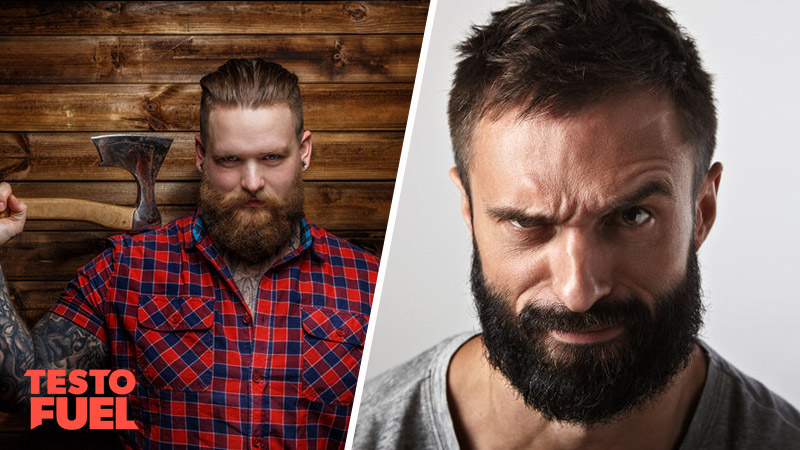TestoFuel Blog : Make Gains & Pack on the Muscle

Many evolutionary biologists believe that men developed facial and body hair as a way of protecting them from the sun whilst they were out hunting for food. Some say it was to add camouflage so that they could stalk their prey undetected.
But either way, it’s a manly characteristic for one of the manliest duties.
And what hormone do you often associate with masculinity? The answer: testosterone
So is a beard really a sign of high testosterone? Could male hormone levels affect your ability to cultivate facial hair to be proud of?
In this article, we take a look…
Testosterone is an androgenic, steroid hormone produced naturally in the Leydig cells of the testes.
It is regulated by release of a hormone called gonadotropin-releasing hormone (GnRH) which sends signals from the brain directly to your testes. The more signals that the Leydig cells receive, the more T is produced.
A man with optimal androgen levels is strong, confident and masculine. He has a muscular frame, low body fat and performs well – both on the sports field and in the bedroom.
Male hormones have two categories of effects:
Once you reach puberty you see your first significant increase in androgen levels. From that point on you begin to develop:
Once you reach the age of thirty though, your GnRH doesn’t stimulate the Leydig cells as effectively, therefore your body doesn’t produce as much testosterone.
The consequence? all of these much sought-after characteristics begin to decline. You’ll start to lose muscle and bone mass, you’ll begin to develop belly fat and begin to lose your hair.
Your physical characteristics are due in part to testosterone. Physical masculinity, metabolic health and a number of sexual characteristics are all controlled by this natural androgen.
Think of the most masculine guy you know. Chances are he’s not only strong, dominant and imposing, but he’s got a decent beard too. That’s because facial hair and masculinity go hand in hand.
Think about guys who are wise and virile? Yep, they’ve got beards too. As the old saying goes – ‘if your dad’s not got a beard, you’ve got two moms’.
It’s no coincidence that as testosterone levels begin to rise during puberty, facial hair starts to grow – albeit one of the last characteristics of puberty. Do girls have this rise in testosterone? No, only guys.
It might begin wispy, fuzzy and pale-looking, but eventually (for most) your facial hair begins to get thicker and darker. For the lucky ones, by your late teens, this quickly becomes a beard.
According to research studies [1], the development of facial hair has both evolutionary and social perception value:
Some guys are just gifted. They’re able to grow a full, thick beard almost overnight. Why is this?
Well, whilst it’s often brushed off as simply ‘genetics’ or ‘it runs in the family’, it’s really down to two hormones – testosterone and dihydrotestosterone.
dihydrotestosterone or DHT is a metabolite of testosterone. It is a much more potent androgen compared to testosterone but can’t be produced without testosterone being available first.
What happens is that testosterone acts as a prohormone – a kind of helping hand hormone that gently nudges DHT production in the right direction. It does this with the help of a catalyst enzyme called 5-alpha reductase (5-AR).
Typically, if your T levels are high, your DHT levels are high too.
Together, these two hormones are responsible for many characteristics. One of them, of course, is beard growth.
So if facial hair is a sign of optimal testosterone, it’s no surprise that women find it attractive. A study published in the American Psychological Association [2] found that when women judged the attractiveness of either fully bearded, moustached, goateed or clean-shaven men, women chose beards.
The women volunteers claimed that beards helped men look more masculine, mature, good-looking, dominant, self-confident, courageous, liberal, nonconforming and industrious.
If there’s ever an excuse to grow out that facial hair, there it is!
There are a number of areas that are sensitive to androgens. These include your genitals, underarms, chest, legs, arms and of course, your face.
If you look at the research into facial hair, both androgens play a separate, but complimentary role when it comes to male facial hair growth [3].
The result is facial hair that is different to the hair on top of your head. It is thicker as it has a flatter shaped follicle, making it curlier than scalp hair, and much coarser too.
There’s a definite correlation between men who suffer from hypogonadism (clinically low testosterone) and body hair loss.
As you know by now, androgens control hair growth. Low androgens equal loss of hair.
Most definitely. And it should be something you are focused on if you want to maintain your health, grow a beard, improve your body composition and optimize masculinity.
Natural T boosters such as TestoFuel contain a number of essential nutrients specifically designed to help you add muscle mass, elevate your T levels and improve your libido.
Packed full of testosterone boosting ingredients such as vitamin D, D-aspartic acid, oyster extract and magnesium, this powerful supplement has the ability to support:
TestoFuel is ideal for improving your performance both in and out of the gym and helping you attain that all-important muscular physique.